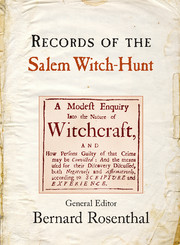Book contents
- Frontmatter
- Dedication
- Contents
- Associate Editors
- Acknowledgments
- I LIST OF FACSIMILE PLATES
- II GENERAL INTRODUCTION
- III LEGAL PROCEDURES USED DURING THE SALEM WITCH TRIALS AND A BRIEF HISTORY OF THE PUBLISHED VERSIONS OF THE RECORDS
- IV LINGUISTIC INTRODUCTION
- V EDITORIAL PRINCIPLES
- VI CHRONOLOGICAL ARRANGEMENT
- VII RECORDS OF THE SALEM WITCH-HUNT
- Timeline: Court of Oyer & Terminer and Superior Court of Judicature
- Biographical Notes
- Works Cited
- Indexes: Introduction
- Names Included in Document Titles
- Concordance of Names
IV - LINGUISTIC INTRODUCTION
Published online by Cambridge University Press: 25 October 2017
- Frontmatter
- Dedication
- Contents
- Associate Editors
- Acknowledgments
- I LIST OF FACSIMILE PLATES
- II GENERAL INTRODUCTION
- III LEGAL PROCEDURES USED DURING THE SALEM WITCH TRIALS AND A BRIEF HISTORY OF THE PUBLISHED VERSIONS OF THE RECORDS
- IV LINGUISTIC INTRODUCTION
- V EDITORIAL PRINCIPLES
- VI CHRONOLOGICAL ARRANGEMENT
- VII RECORDS OF THE SALEM WITCH-HUNT
- Timeline: Court of Oyer & Terminer and Superior Court of Judicature
- Biographical Notes
- Works Cited
- Indexes: Introduction
- Names Included in Document Titles
- Concordance of Names
Summary
INTRODUCTION
The rise of a new linguistic variety is always an exciting phenomenon, as regards both the early stages of the variety and its subsequent life cycle. Among the transported extraterritorial varieties of English, American English is of particular interest, having been the first to emerge and having developed into a language variety of worldwide significance. The roots of this variety lie in the British English local varieties of the early seventeenth century, but once in the colonies, the new variety and its local forms followed their own paths of development. The records of the Salem witch-hunt provide firsthand evidence of language use of the period in both specialized, formal writing and in less formal, speech-related contexts.
It is important to place the Salem records in their socio-historical setting as regards the development of early American English in general. The writings, both printed works and manuscript records, that have survived from early New England are of a primarily utilitarian nature, produced by first-generation settlers and their descendants. Among these writings are not only legal documents such as those included among the Salem records but also town records, diaries, travel journals, and accounts of “memorable providences” (i.e., natural phenomena allegedly indicative of God's works). They exhibit a wide range of linguistic variation, reflecting both features characteristic of the local dialects transported from the mother country and the results of dialect mixture and various leveling phenomena inherent in early settler communities. Most early immigrants to New England came from all over England, but the East Anglian counties were best represented.
In discussions of extraterritorial linguistic varieties, attention has been paid to factors promoting and/or retarding change. Even though these factors pertain to language change in general, the new regional and sociodemographic environment of an emerging variety, and constant changes in it, may further increase the tension between linguistic innovation and conservatism. In terms of regional and/or social variation, two main directions of development have been distinguished: unification and diversification. At the same time as the new variety develops toward uniformity (various types of settler inputs start merging), it begins to diverge from the usage of the mother country. Continuous waves of migration and other extralinguistic factors tend to intensify the influence of these forces.
- Type
- Chapter
- Information
- Records of the Salem Witch-Hunt , pp. 64 - 90Publisher: Cambridge University PressPrint publication year: 2009
- 6
- Cited by



